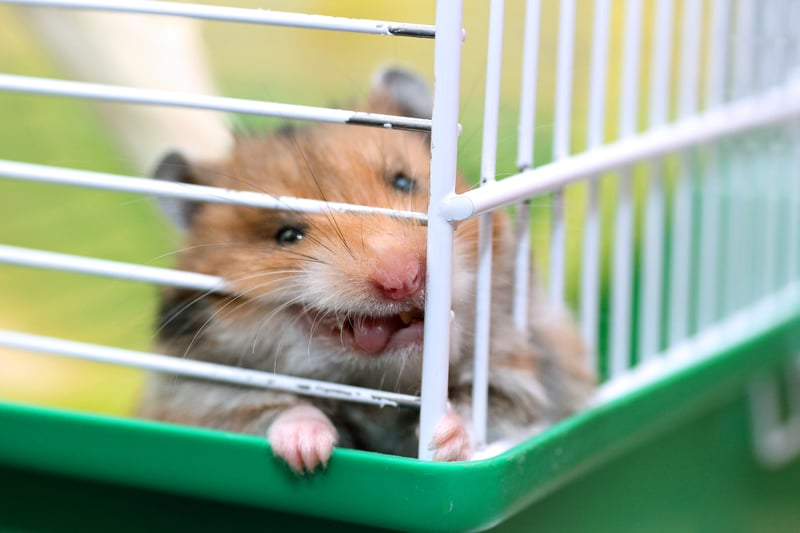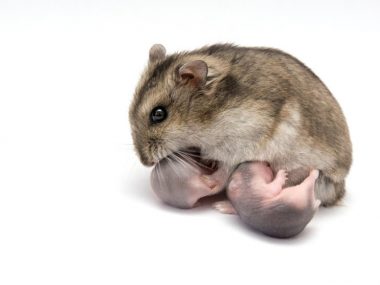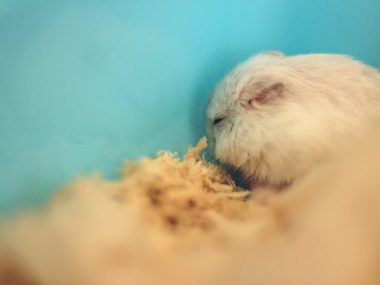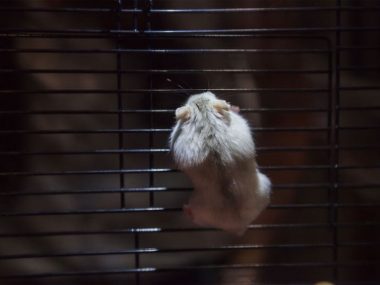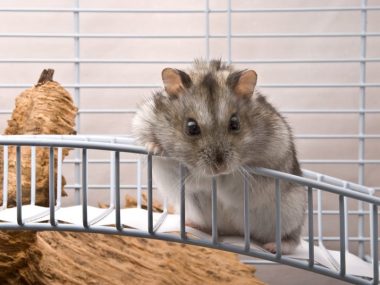Most hamster owners are understandably concerned when their hamster starts chewing their cage bars, like an unhinged Alcatraz inmate desperate for escape. Cage biting is not a healthy hamster behavior and needs to be promptly addressed. Understanding why your hamster bites its cage can provide vital clues to how you can improve your hamster’s life.
Hamsters bite their cage bars due to mental health or dental issues. It is essential to stop excessive cage chewing as the hamster may escape or inadvertently harm itself, e.g., dental trauma or poisoning. To stop the behavior, owners need to address the “why” behind the hamster’s bar chewing.
Hamsters rarely bite their cages for no reason. Owners who are frustrated and concerned by their hamster’s obsessive chewing need to understand why they may be motivated to gnaw on their cage; only then can an appropriate solution be implemented.
Table of Contents
Why Do Hamsters Bite Their Cage?
Like most rodents, hamsters are enthusiastic chewers, and they have earned a reputation for biting, chewing, and gnawing on anything that strikes their fancy. However, healthy hamsters refrain from chewing items that can cause them injury.
Chewing on solid cage bars definitely falls into the category of problematic gnawing behaviors found in hamsters. Cage chewing is rarely innocent and often a symptom of a more significant problem; it is neither normal nor healthy for happy, content hamsters to bite their cage.
The most common causes for cage chewing in hamsters can be divided into four categories:
- Dental issues
- Boredom
- Stress caused by a small cage, incorrect bedding depth, exposure to predators (i.e., cats), rough handling, disrupted circadian rhythms, crowded cages, and fighting between cagemates
- Stereotypic bar chewing, i.e., OCD-type obsessive bar chewing
Why Is It A Problem If A Hamster Chews On Its Cage?
It is often frustrating figuring out why your hamster is chewing on its cage, but it is well worth the effort. Hamsters who chew on their cage bars may inadvertently harm themselves, and as any experienced hamster knows, prevention is always better than a cure.
Treating an injured or sick hamster is challenging, and thus it is easier to prevent them from harming themselves than trying to treat it after the damage is done.
Hamsters who gnaw on their cage are vulnerable to:
- Dental trauma
- Bar rub
- Poisoning
- Escape
- Declining mental and physical health
Dental Trauma Caused By Hamsters Cage Chewing
According to PetMD, hamsters chewing on the bars of their cage may accidentally chip or break off one or more of their teeth. A broken incisor may grow back crooked or not grow back at all!
A broken cage wire with a sharp point or incisor fragment can injure the hamster’s gums and hard palate. Oral lacerations are associated with increased bacterial growth, secondary infections, gum inflammation, and mouth ulcers.
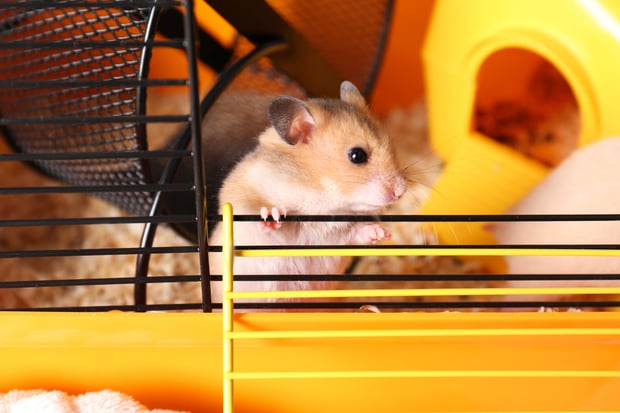
Injuries to the mouth are painful, and hamsters with dental issues (even self-inflicted ones) often stop eating and begin losing weight. Extreme weight loss can result in lethal anorexia and immunocompromise.
Bar Rub Occurs In Hamsters Who Chew Their Cage
Hamsters who attempt to chew the bars of a metal cage will forcefully push their nose between two bars so that they can gnaw the bars. The force behind the repetitive motion will slowly rub away the hamster’s nose fur and cause skin and tissue damage; this type of injury is known as “bar rub.”
Hamsters with open bar rub injuries are vulnerable to infections. Infections in hamsters are challenging to treat and can be lethal depending on the severity of the injury and infection.
Once healed, bar rub injuries often leave permanent scars that may interfere with the hamster’s ability to breathe.
Ingesting Metal Is Not Healthy For Cage Biting Hamsters
Many owners use adapted cages to house their hamsters, i.e., the cage was not designed to be hamster safe. Painted cages made of metal can be toxic to hamsters if metal or paint flakes are ingested.
If the hamster swallows a piece of metal, the metal may cause gastrointestinal obstructions or lacerations; gastrointestinal trauma is a serious, often fatal condition for hamsters.
Escape Is Rarely A Good Option for Cage Chewing Hamsters
Although you hamster may believe that escape is a good option, it really isn’t!
Hamsters bred in captivity are not adapted to the wild; the escaped hamsters may be injured or killed by other animals, starve to death or die from exposure to harmful environmental conditions.
Stress-Induced Health Issues In Cage Chewing Hamsters
Failing to correct cage chewing in a hamster may indirectly cause the hamster’s physical and mental health to worsen as the underlying stressor goes unaddressed.
Cage chewing is often a symptom of a larger problem (e.g., boredom and stress), which you must address to ensure your hamster is happy and has a good quality of life. Chronic stress in hamsters is associated with:
- Wet tail diseases such as Proliferative Ileitis and Tyzzer’s disease.
- Overgrowth of a hamster’s mite population and development of clinical mange.
- Increased aggression towards cage mates and their human handlers.
- Infanticide in sows with litters, i.e., a mother hamster may kill her babies if stressed.
- Stereotypic hamster cage chewing, i.e., unstoppable habitual bar chewing
How Do I Stop My Hamster Biting Its Cage?
The effectiveness of strategies used to stop hamsters from biting their cages depends on why they started bar chewing in the first place.
Stopping Hamsters With Dental Issues From Cage Biting
Most hamsters engage in cage biting because of stress and boredom; however, a small percentage of hamsters will start bar chewing due to overlong incisors.
Hamster teeth do not stop growing. To prevent dental issues, your hamster must receive routine dental care.
If your hamster has long teeth, you should take it to a veterinarian to trim its teeth. However, a healthy hamster will naturally maintain an optimal tooth length if they have access to chew toys and hard feed blocks.
Addressing Boredom And Stress In Cage Chewing Hamsters
Boredom and stress are the number one causes of cage chewing in hamsters. Although a hamster may become stressed for many reasons, the most common stressor seen in bar chewing hamsters is inadequate cage size and bedding.
According to a 2007 study, Syrian hamsters housed in 1550 square inch cages showed less bar chewing behavior than their counterparts housed in smaller enclosures. A hamster’s cage bedding should be deep enough to allow the hamster to engage in natural nesting and tunneling behavior.
A hamster’s boredom is easily relieved by ensuring you hamster is given plenty of toys, appropriate hamster-safe treats, and time out of the cage to explore their surroundings.
Fixing Stereotypic Cage Chewing In Hamsters
Hamsters who engage in stereotypic bar chewing are more resistant to correction. These chronically anxious hamsters have obsessively chewed their cage bars for so long that, like any addict, they can’t stop! Removing stressors won’t prevent an obsessive bar chewing hamster from biting their cage bars.
The only way to stop a stereotypic bar chewing hamster is to house them in a large, well-ventilated glass cage. The logic behind this cage move is that if there are no cage bars, there are no opportunities for the hamster to bar chew.
Are Cage Chewing Deterrents Effective For Hamsters?
Owners may attempt to deter their hamsters from bar chewing by painting bitter liquids (e.g., lemon juice and apple cider vinegar) on the cage bars or attaching wooden pegs to the cage bars.
While these methods can be effective if used in conjunction with other strategies, they are not effective in isolation. A hamster will continue to chew their cage as long as the boredom, stress, and health triggers remain relevant.
Conclusion
Cage chewing is not normal or healthy behavior for hamsters to engage in. A hamster who obsessively chews the bars of its cage is communicating an important message to its owner, “something is wrong, please help!”
Hamsters will chew on cage bars because they are bored, stressed, or trying to maintain their dental health. To stop excessive cage chewing, owners need to identify why their hamster is chewing on their cage; only then can the behavior be addressed successfully.
References
https://www.thesprucepets.com/why-is-my-hamster-biting-the-cage-5095735
https://www.merckvetmanual.com/all-other-pets/hamsters/disorders-and-diseases-of-hamsters?query=hamster%20disease
http://www.hamstercentral.com/community/hamster-healthcare/26936-ocd-traumatised-hamster.html
https://www.rvc.ac.uk/Media/Default/Beaumont%20Sainsbury%20Animal%20Hospital/documents/caring-for-your-hamster.pdf
https://www.msdvetmanual.com/all-other-pets/hamsters/routine-health-care-of-hamsters?query=hamster%20teeth
